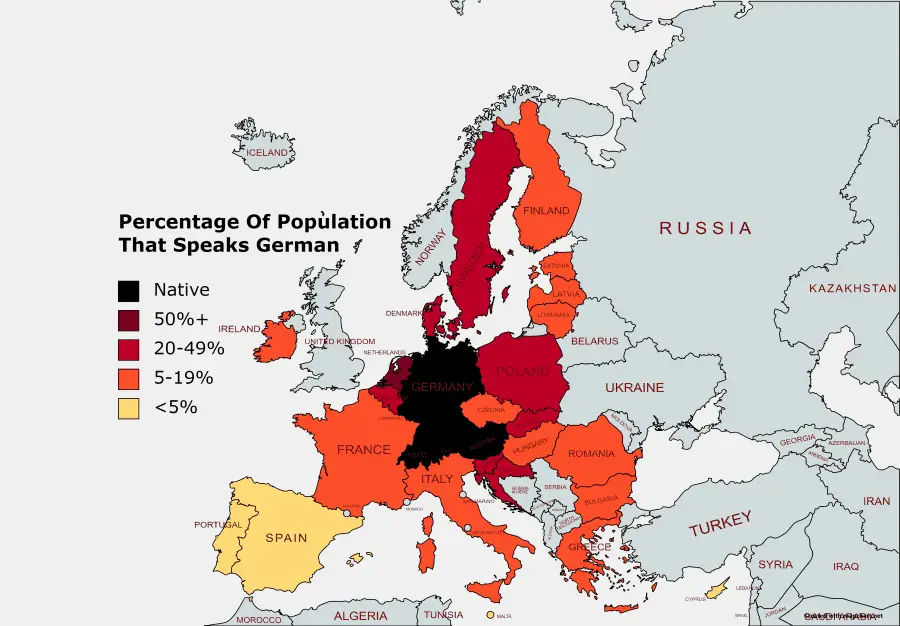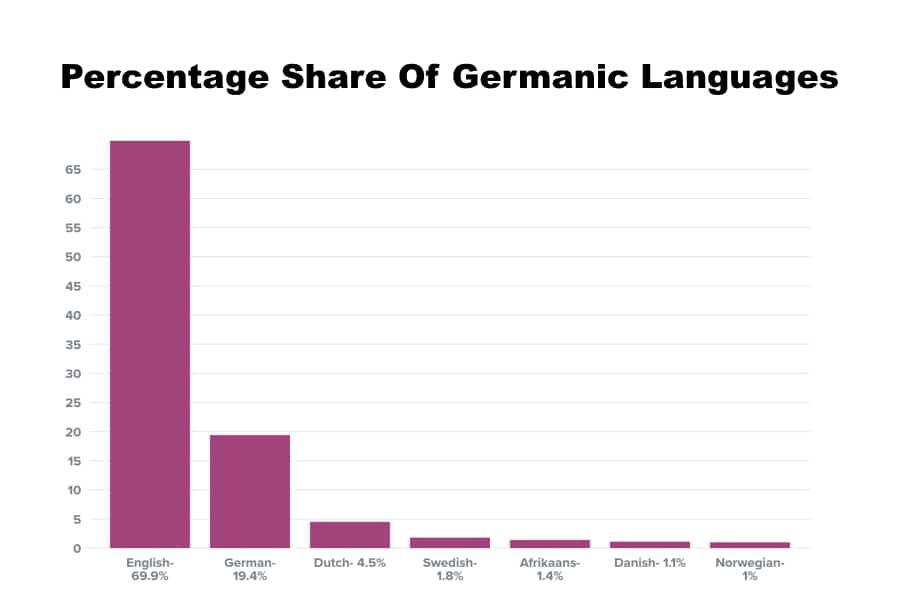The roots of our languages are far different than most realize. Even a few centuries back, the languages we speak today would be so foreign to our ears in everyday usage that they wouldn’t seem like the same languages at all. What about German? Is German directly connected to its roots or is it a Latin based language along with others in Europe?
German is a West Germanic language and has no real connection to Latin save slight later developing influences. Latin’s impact concentrated in the southern cultures and nation-states of Europe. Germanic based languages emerged in northern Europe including the Scandinavian regions.
In this article I will look at German and Latin, their roots, and any connections they share. Both are studied in schools around the world for their usefulness and contributions to history. Only one of them has gone unchanged for centuries and only one of them is considered a ‘living’ language today.

Contents
Is German From Latin?
Since many of the languages in Europe are for Latin origin, is German among them? If it is not Latin based, then is there a significant influence from Latin over the years that can be detected in modern German?
German is not a Latin based language, but is rather a West Germanic language with its own distinct lineage of influences. It formed from the various languages and dialects of the northern European Germanic tribes. Latin became the lingua franca of the Roman Empire which resisted these tribes.
There are some influences from Latin that can be found in the modern German language, but those are fewer than one may imagine. Lone words in German that have Latin roots tend to come via multi-stepped path.
English was highly influenced by Latin through French occupations of the English Isles and English occupation of French mainland holdings. Richard I ‘the Lionheart’ the King of England in the 12th century made his residence for most of his life in his holdings in the north of what today is France.
What was Richard I’s language of choice and native tongue? French.
The Latin based French language had a huge impact on English language development over the centuries.
What does this have to do with German? Well, today you will find many loan words from English in the German language. This can be said of other Romance languages like Italian and Spanish as well, but the extent of the 2 step Latin influence via English is fairly pervasive.
There is some direct influence of Latin in the German language of today, but it is fairly small. Where you will find it is in the loan words coming from Latin based languages, or languages influenced heavily by it.
German Language Roots

The German language has its own history and developmental path in northern Europe separate from the Latin that so heavily influenced the communication in the south of the continent. It’s deep guttural sounds and harsher endings can even be readily noticed just in the spoken pronunciation.
There is also a distinct difference between the grammar and vocabulary formation between the two. Most notably is the formation of entirely new words in the Latin tradition versus the compound practice in German. This accounts for the frequency of very long words in the German language.
Let’s look at how German formed separately from Latin and what makes German so unique.
Why Is German Not Latin Based?
If German is not based on Latin, then how did it come about so close the the dominance that was the Roman Empire?
In his chapter of the book Germanic Standardizations: Past To Present, Klaus J. Mattheier of Heidelberg University details the origins of the German language of today, from the West Germanic languages of the tribes during the late 4th and early 5th century AD. This is after the decentralization and disintegration of the Roman Empire.
Though at this time, much of the population of the Roman legions were filled and led by peoples of Germanic origin given citizenship for their service, Latin was not the language of the Germanic tribes to the north of the empire. There were fortifications and strict immigration policies that prevented the mixing of these languages.
Furthermore, as detailed in his book Timeless: A History of the Catholic Church, historian and professor Steve Weidenkopf lays out the disintegration of the Roman Empire not as an invasion by Germanic tribes, but as a Roman civil war between Legions populated by Latin speaking soldiers of Germanic origin.
After the conquest of Rome by Roman Generals and the empire was decentralized, kings, dukes, and counts from the leadership of these now separated former Roman legions emerged. Latin reigned and spawned many other languages in these areas, whereas in the north, Germanic languages evolved independently.
List Of Major Germanic Languages
What are these languages that sprang up without help from the Roman influence and their unifying language of choice? Let’s look at the modern derivatives still used today.
Chart Of Germanic Languages That Originated Without Latin Influence
| West Germanic Languages | North Germanic Languages | East Germanic Languages |
| German English Dutch Afrikaans Scots Frisian Yiddish | Danish Icelandic Norwegian Swedish | All Extinct |
These are the major players in the non-Latin speaking European continent. Though they were steered at times by Latin in their development, their roots are completely different.
Let’s now see which of these languages are more commonly spoken and how much of a share they encompass overall in the Germanic language category.

Not only is German not Latin inspired, it is also one of the major languages of the world. Of the Germanic languages, it is the number two most widely spoken. In the world it holds the 12th most spoken language by number of speakers.
If you would like to read some other articles about Latin and German, see my other articles here…
- Is German Fun To Learn? (Self Learner Reveals)
- How Common Is Spoken English In Germany? (Shocking Answer)
- Is Latin Hard To Learn? And Is It Worth It?
Is Latin Germanic?
Which language came first and did Latin actually come from a Germanic language? There are some crossover points, so could it be that the Germanic tribes in the north gave rise to Latin?
Latin is not Germanic and evolved centuries before a unified German language and is one of the more ancient languages we have today. German or other Germanic languages started their evolution in the 4th and 5th centuries from the various tribal languages of northern Europe.
Not only is Latin not Germanic, it is one of the foundations of many modern languages today. It is a language that developed around Rome over 2,000 years ago.
Today it is not in common spoken use, but is still the source of many medical terms. Another noteworthy use of Latin is by the Catholic Church. The practice of using Latin in all Masses ended in the 1960’s but is still spoken in Catholic Liturgy in the Traditional Latin Mass in certain parishes to this day.
List Of Major Latin Based Languages
If Latin had such a wide reaching effect, what are some of the languages that are based on or have been influenced by it? Let’s take a look at some of the commonly spoken languages today that have Latin in their ancestry.
List Of Modern Languages Affected By Latin
| Latin Based Languages | Languages Influenced By Latin |
| Italian French Portuguese Spanish Romanian Catalan Romansh | German Dutch Norwegian Danish Swedish |
You will notice that many of the Languages that sprang from Latin are southern European languages. This makes sense seeing as it was the shared language of the Roman Empire, which was centered in… well… Rome.
The influence of the Romans was fairly pervasive in Europe and stretched as far as the Britannia in the north, to northern Africa in the south. Many may not realize that the Middle East before being conquered by Arab Muslims was considered the center of art and learning for the Roman Empire. The unifying language was Latin.
Today, the languages in this list are the primary vestiges of a once dominant language. Though Latin still exists today, it is no longer an force in the world of communication as it was thousands of years ago.
Does German Sound Like Latin?
Many languages that are not directly connected can sound similar to one another. Believe it or not, there are quite a few people that think Japanese and Spanish sound similar. But does German sound like Latin?
German does not sound similar to Latin in tone or the general flow of the language. German has more hard stops in pronunciation and sentence structure. The vowel sounds can be said to be similar, but many of the diphthongs and consonant combinations have completely different sounds.
But wait, isn’t Latin a ‘dead’ language. How could anyone hear what it sounds like?
Though the exact intonations are not known now, we do know how it sounded and can give a pretty close estimate. A good example of what it would have sounded like to hear Latin spoken in everyday use is to hear what it sounds like recited today.
The Latin Rosary is spoken aloud by hundreds of thousands of Catholics every day. To really get an idea of how it compares to German, all you have to do is to listen to it recited.
Now listen to the same Rosary recited in German and you can tell the difference in the sound immediately. Some say that the sound or accent most used today for speaking Latin sounds a bit like Spanish rather than German.
Though correlation does not equal causation, we do know that German did not come from a Latin base. So it stands to reason that their sounds would vary greatly. In the case of German and Latin, they most certainly do.
There are words that crossover for sure, but many of them are loan words and not derivatives that formed from Latin to German. There are English, French, Italian, and even Spanish words incorporated into German that leaves the fingerprints of Latin all over it.
Is There Any Evidence Of Latin In German?
According to one of the most respected online German dictionaries, words that have Latin roots makes up 5.6% of the German total vocabulary. The German equivalents may be newer or older adoptions, but they are none-the-less Latin inspired.
Let’s look at some of the more used words in German that are shared with Latin (noted without gender articles)…
| Latin Base Word | German Derivative | English Translation |
| habeo | haben | to have |
| musica | Musik | music |
| doctor | Doktor | doctor |
| super | super | super |
| minuta | Minute | minute |
| thema | Thema | theme |
| universitas | Universität | university |
| energia | Energie | energy |
| pausa | Pause | pause |
| agente | Agent | agent |
| regio | Region | region |
| roma | Roman | roman |
| explosio | Explosion | explosion |
| informatio | Information | information |
| absurde | absurd | absurd |
You can see from this list, and there are many many other words, that Latin at times directly influenced German, but so did other languages like English that were also touched by Latin’s inspiration.
Though Latin isn’t a language used in communication today, it lives on in many languages that it touched around the world.
The Final Word On Is German A Latin Based Language…
Is German a Latin based language? No, it is a Germanic language, but throughout the centuries it has taken additions from Latin itself and other languages that sprang from it.
To truly find out where a language originated, it is as simply as following history back. Only comparing languages as they exist today may lead us astray.
Latin and German both have their place today, it just depends on the goals of the ones using them. But, that is the way of all languages.
To read more about German, Latin, And English…
